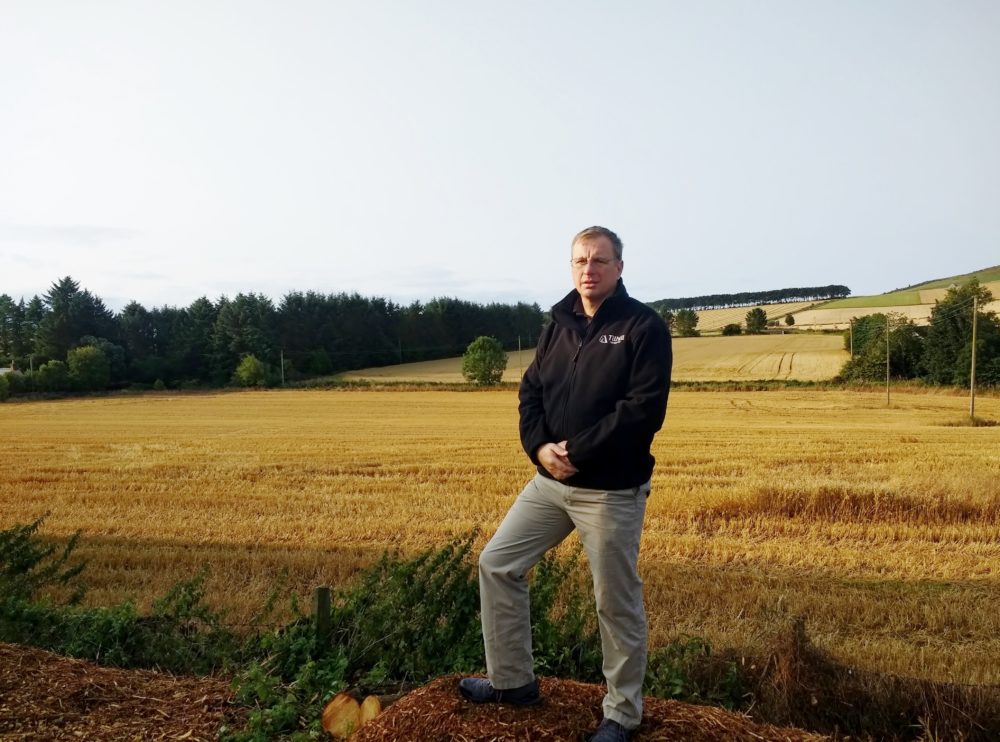Growing Our People Q & A with Tilhill Forestry New Business Manager and Senior Forest Manager Calum Murray.
“I can see how my decisions are shaping the landscape.”
What do you do? Tell us about your typical day?
I have been in this new role of New Business Manager for just over 6 months and would say there is no such thing as a typical day, every day is different. There is a great variety of work. One day I may be pricing a tender for work on a Military base then the next, looking at landscaping work on a major new roads project.
A significant part of my work involves looking over land for potential planting schemes or at existing forests for clients to purchase. I could be designing a new scheme for a whole hillside or working out how to maximise income for an owner from felling and restocking. In between all this I spend time finding and meeting potential new clients with woodlands they possibly want Tilhill Forestry to consider managing. Of course, all this work takes an experienced eye to understand the potential of a woodland and draw up plans and budgets for owners. The mixture of work is therefore really interesting.
How did you get into forestry?
Having left school without a particularly great set of exam results I was not really sure what I wanted to do but was lucky to get a job on a local estate where I worked in their woodlands and on a small fish farm. I enjoyed both areas of work but opportunities led to a job on the west coast in fish farming for a few years, in days when health and safety had not discovered the industry.
I realised that really I preferred dry land, or as dry as it gets on the west coast and this stirred me to go back to night school and get the qualifications I needed to get into Aberdeen University to study forestry. With my degree in hand and some good work experience gained during summers working with Tilhill’s Dunoon team I got a job as a forester with the Forestry Commission where I spent the next 20 years in a variety of roles before coming back to Tilhill Forestry.
What do you like most about working in the forest industry?
I suspect any forester will tell you that the opportunity to work in the outdoors is one of the things that attracted them to forestry and I am no different. The variety of the work keeps it interesting. Over my career I have enjoyed looking back at on sites where I have been responsible for the planting and can now see maturing crops (see I have been at it that long) coming along nicely or I can see how my decisions are shaping the landscape.
Why did you decide to work for Tilhill Forestry?
I still remember the positive experience I had when I worked for Tilhill Forestry as a student so when I decided it was time for a change, after 20 years with the Forestry Commission, Tilhill Forestry was at the top of my list of companies to work for.
What do you like most about Tilhill Forestry?
Tilhill has a scale where there is lots of experience to draw on and equally the company values the experience of its employees.
How do you feel Tilhill Forestry contributes to its employees’ professional development?
I have to say since joining the company I have had a great experience. There is no doubt I came to the company with some of my practical skills a bit rusty having basically been a people manager for a good number of years. The company has provided the training I needed and also, since I have changed roles recently, continues to help with training and, importantly for me, providing challenges that help me continue to develop new skills
What sorts of changes are occurring in your occupation?
Technology is the big one. Like many people, I can remember sitting hand drawing maps and the blue colouring pencil for Sitka never out of reach. Today we live in a world of GIS, drones and mega spreadsheets. They all help but nonetheless we still need the basics of getting out spade or peat probe in hand and understanding the ground.
How does a person progress in your field?
Understand and be passionate about good forestry but most importantly talk to people. Of course forestry is about trees but it is people who own, grow and manage them. Listen and learn from others, share your own experience, build your network and draw on all of that when the opportunities come along.
What is your advice to anyone wishing to pursue forestry as a career?
If you can get started with some hands-on experience of practical forestry such as planting trees, fencing or working a saw then you will gain an understanding that no college course can give you. You’ll draw on that basic experience throughout further education or the rest of your forestry career.



